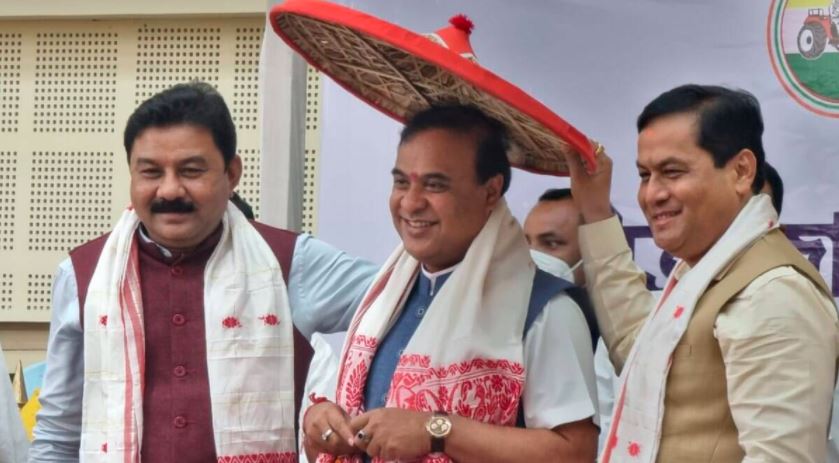A week after the election results were announced, Himanta Biswa Sarma became the Chief Minister of Assam. The oath-taking ceremony was held at the Srimanta Sankardev Kalakshetra in Guwahati. Sarma’s ascendency to the top has been nothing short of spectacular. Through his dedicated work ethos and a penchant for knowing the nerve of the public, Sarma managed to create a separate identity for himself, all the while propelling BJP to the top in the state. TFI analyses some key moments in Sarma’s career that made him the current CM of Assam.
Congress letting go of Sarma
The biggest mistake committed by the Indian National Congress in the recent past apart from its decision to stick with the Gandhi family is how easily it let go of a disgruntled Himanta Biswa Sarma to the BJP. Sarma was a victim of the Congress Party’s politics of entitlement. Despite being among the shrewdest politicians in the country, the family repeatedly chose sycophants and dynasts over him. After changing lanes, Sarma gradually realised his potential. and became an important asset for the BJP and a vital cog in the Modi-Shah scheme of things.
Sir @OfficeOfRG,who knows him better than me.Still remember you busy feeding biscuits 2 him while We wanted to discuss urgent Assam’s issues https://t.co/Eiu7VsuvL1
— Himanta Biswa Sarma (@himantabiswa) October 29, 2017
What happened afterwards is something that Congress is still cussing itself for. Sarma ended up delivering the North East in 2016 to the BJP which earlier used to be a stronghold of the INC.
After Gogoi’s demise, Congress further plunged into misery as the party didn’t learn from its mistakes of 2016 and ended up siding with an Islamist leader and a polarising figure like Badruddin Ajmal — in hopes of cashing in on the Muslim votes. The move stunningly backfired and Congress was left to scamper around for tiny morsels of votes.
The CAA-NRC issue and how Sarma used it for BJP’s benefit
While BJP in its manifesto in March had not explicitly talked about it, the victory, however, all but gives it the mandate to pursue the issue with more ferocity. The North-eastern state has been facing the problem of illegal immigrants swarming to the state in hoards for some years now. Bringing CAA-NRC is being seen as the ultimate antidote to quash the decades-old problem.
The party succeeded in portraying illegal Muslims of Bengali origin as the biggest threat to the indigenous communities in Assam and ultimately used it for its benefit. A move that was engineered by none other than Sarma himself. Convincing the Muslims about their real identity and earning their trust on CAA-NRC was one of the reasons why the Congress-AIUDF alliance failed to rake in the minority votes.
Moreover, Assam Jatiya Parishad (AJP) and Raijor Dal, the two parties formed as an outcome of the anti-CAA protests, managed to win only one seat, which appears to be another proof of Sarma’s water-tight strategy.
Read More: Assam victory vindicates BJP’s stance on CAA and this opportunity must not go to waste
After the anti-CAA violence took the grip of the state last year, there were reports about BJP leaders harbouring worries about the political fallout of the move. However, Himanta Biswa Sarma the man who mattered the most maintained his composure throughout the crisis and kept supporting the CAA.
Large number of overwhelmingly enthusiastic people joined @BJP4Assam Peace & Prosperity march at #Nalbari, led by HCM @sarbanandsonwal, Hon Ministers, MLAs, BJP President @RanjeetkrDass
I thank people for your continued faith in us. Your love keep us driving to achieve the best. pic.twitter.com/L811SWlERk
— Himanta Biswa Sarma (@himantabiswa) December 20, 2019
Sarma, the hard taskmaster and his efficient handling of the Covid crisis
During the election trail, BJP never announced Sarbananda Sonowal as the CM candidate. And despite Sonowal’s exemplary work, it was Sarma who led the party from the front. Being a Health Minister, Sarma’s handling of the COVID-19 pandemic, soared his popularity in the state.
The improvement done in roads, bridges and other infrastructure as the PWD minister also played into his hand. Sarma also held the Education, Finance, and Transformation and Development departments, and was the most visible face of the government. He brought several reforms to the education sector as a minister, and have been presenting balanced budgets focusing both on development and social welfare as a Finance Minister.
As reported by TFI, it was under Sarma that the Assam government tabled the bill which seeks to abolish state-run madrasas and convert them into regular schools
”We’ve introduced a Bill whereby all Madrassas will be converted into institutes of general education and no madrassa will be established by govt in future. We’re happy to introduce this Bill to bring truly secular curriculum in the education system,” Sarma was quoted as saying.
There are myriad reasons as to why Sarma managed to catapult himself to the top position of a state, despite joining an opposition party mere five years ago. However, the aforementioned three reasons have been the key moments that helped Sarma ascend the CM throne.

